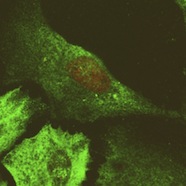Researchers profiles:
- Professor Antony Braithwaite
- Professor Margaret Baird
- Dr Nicholas Fleming
- Leon Deverick
- Melanie Miller
- Michelle Wilson
Shedding light on cells under stress
The p53 protein controls decision-making for cells under stress and is found to be mutated in approximately 50% of all cancers. These changes can both block the normal functions of p53 and allow it to gain new detrimental functions.
It has recently been realised that p53 has alternative natural isoforms that may also be relevant to cancer and it is possible that some gain-of-function mutations mimic the roles of these.
This programme is focused on understanding the mechanisms of p53 mutations in cancers and how these relate to the expression of the natural alternative isoforms of p53.
Relevant references
Campbell, H. G. et al. Does Delta133p53 isoform trigger inflammation and autoimmunity? Cell cycle 11, 446-450, doi:10.4161/cc.11.3.19054 (2012).
Slatter, T. L. et al. Hyperproliferation, cancer, and inflammation in mice expressing a Delta133p53-like isoform. Blood 117, 5166-5177, doi:10.1182/blood-2010-11-321851 (2011).
Related topics

Stabilisation and nuclear localisation of p53 (red) to nucleus in a stressed cell.
Funding
Collaborators
- Associate Professor Cris Print (Auckland)
- Dr Hamish Campbell (Sydney)
- Professor Roger Reddel (Sydney)